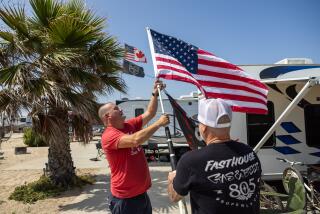Steering Toward Safety
- Share via
You affectionately named your car Old Squeak and are willing to put up with its idiosyncrasies--like having to push the power window button to turn on the radio or hit the dash to change stations.
But when it comes to safety on a long trip, Old Squeak probably needs a checkup.
The best way to take care of a car is by keeping up with a regular maintenance schedule, as recommended by the car’s maker. But even if you have done this, it’s a good idea to have it checked out once more at least a few weeks before your departure.
“You don’t want to wait and go in and get your car checked the day before you leave, just in case the mechanic finds something that will take awhile to fix,” said Robert Mayo, owner of Mayo Motor Car Service in Moorpark.
Word-of-mouth usually works best in finding a good mechanic, but you can also call the Better Business Bureau or the Bureau of Automotive Repair through the state Department of Consumer Affairs, he said.
A thorough safety inspection at his shop costs about $90, he said.
An oil and oil filter change is about $35, new brakes can run about $150 per axle, a complete tuneup runs about $150 or $175 and a new radiator could cost about $400. Prices at all garages depend on the type of vehicle and the kind of parts used, said Floyd Leech, service manager at Camarillo Car Care in Camarillo.
Don’t just call around looking for the lowest price and expect that to be the best choice, he said. Find out if the garage is using the highest quality parts and has trained mechanics.
At Camarillo Car Care, if you ask for the coupon price for an oil change it will cost about $24, even if you don’t have a coupon, Leech said.
Mechanics there will also do a safety inspection at no charge, topping off transmission or other fluids and window-washing solution, he said. Mechanics look at windshield wiper blades, belts and hoses to make sure they are in good shape. A brake inspection costs $34, which is waived if brake work is done there, he said.
But there are some things mechanics can’t see that have to be serviced according to manufacturer recommendations.
“Most timing belts should be changed at 60,000 miles,” Leech said. “If you don’t change it and it breaks, that can cause major internal engine damage.”
An important part of choosing mechanics is knowing how they are trained.
At Camarillo Car Care, the mechanics have to be certified by the Automotive Service Excellence certification process, he said.
Barry Vedi, owner of Thousand Oaks Shell in Thousand Oaks, also has his mechanics certified by ASE, he said.
He charges $35 for a safety inspection that includes checking battery, tires, belts, hoses, fluid levels and other parts of a car that might show wear, he said.
A $14.95 oil change includes a simple visual safety inspection and topping off of fluids.
If brakes are needed, Thousand Oaks Shell will repair them for about $70 an axle, he said.
And a lot of trouble on the road could be avoided if people would flush out their radiators and replace their thermostat every two years, he said.
A radiator flush at his station costs about $30 and a thermostat could run $40 to $80, he said.
One way to find a good mechanic is to look for a shop that is busy, Vedi said. Mechanics at Mountain View Goodyear in Oxnard will inspect your car free of charge, said service manager Craig Layfield.
He also offers free advice on how to pick a good mechanic.
“Look for someone who will look your car over and tell you everything it needs, listed in order of priority before they start,” Layfield said.
You don’t want someone who will pressure you or start fixing one thing and then keep calling you throughout the day adding on more work as if they just discovered it, he said.
The most neglected part of the car is the cooling system, he said.
Basic cooling system maintenance is $29.96 with a coupon. Those without a coupon can ask for the coupon price, he said. An oil change is $15.96. Brakes run from $80 to $140 per axle, depending on the vehicle, and a tuneup costs from about $40 to $60, depending on how many cylinders a car has, he said.
But all maintenance is important. After all, a car is a major investment. The belts, hoses, radiator, antifreeze, tires, tire pressure, oil, filters, fluids, wiper blades, brakes and transmission cannot be forgotten.
“You can’t just put gas in it and change the oil and think you are good to go,” Layfield said.
Nancy Needham writes a weekly consumer column and can be reached at nancy.needham@reporters.net.






